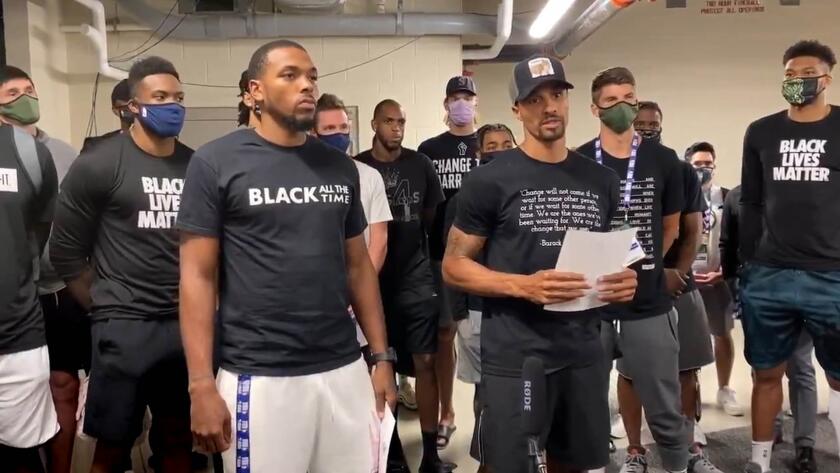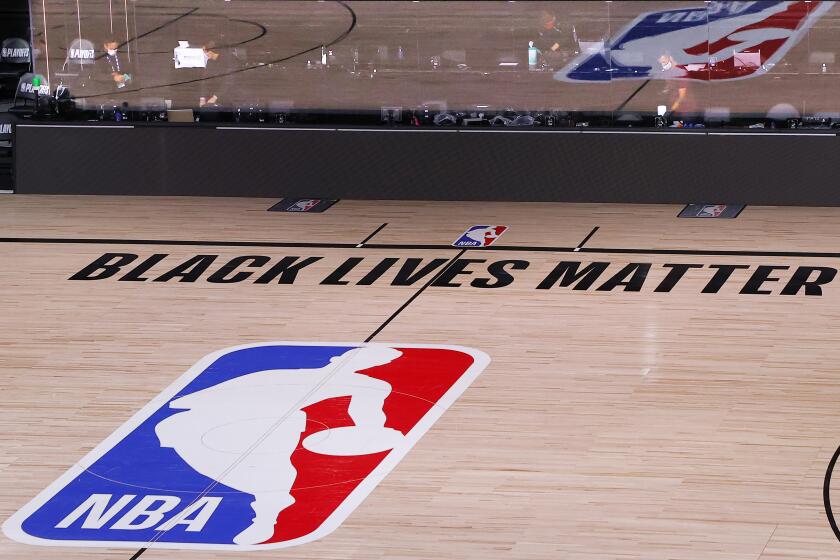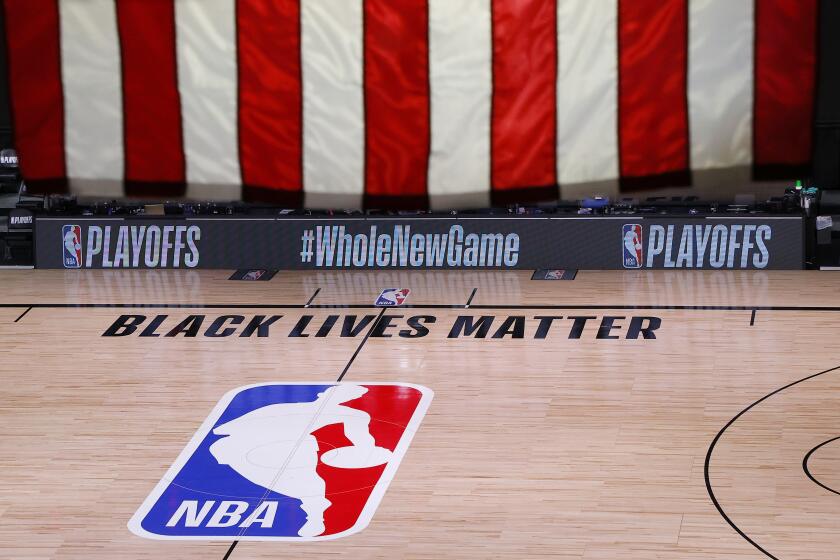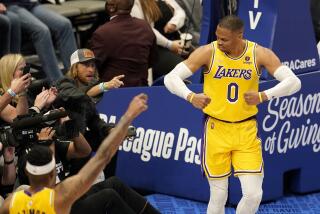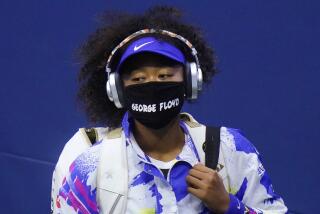Lakers, Clippers willing to cut title drives short to protest Jacob Blake shooting
The Milwaukee Bucks refused to play Game 5 of their NBA playoff series against the Orlando Magic in the aftermath of a police shooting 40 miles from their home arena, leading the NBA to postpone the games scheduled for Wednesday.
ORLANDO, Fla. — In their two months in the NBA’s bubble, the Lakers expressed determination about accomplishing two things: speaking out about racism and police brutality, and winning an NBA championship.
In the aftermath of the police shooting of Jacob Blake in Kenosha, Wis., their coach reminded them during a team meeting that the further they got in the playoffs the bigger their platform would be to talk about injustice.
The plan was to keep playing while processing their pain, keep winning so they could share their heartbreak and fears.
Until Wednesday, when everything changed, and games that counted were postponed in protest for the first time in league history. By the end of the day, the Lakers and Clippers had both decided as teams that they did not want to play any more games.
Lakers forward LeBron James and Clippers forward Kawhi Leonard both spoke up in the players meeting and were adamant about not playing the rest of the playoffs because they wanted change. The players will have another meeting at 11 a.m. EDT Thursday.
The players’ decision was made during a three-hour meeting of players from the 13 teams still competing in the playoffs, according to people familiar with the situation. Whether it will stand is unclear. NBA owners are scheduled to meet Thursday morning here. It’s possible that if the other teams decide to play, the Lakers and Clippers will continue their seasons.
Athletes in the NBA, WNBA, MLB, MLS, NFL, NHL and professional tennis refused to take part in scheduled events in protest of the shooting of Jacob Blake.
Like the Lakers, the Milwaukee Bucks were in position to clinch their first-round playoff series if they could win their Game 5 against the Orlando Magic, the first game of a playoff tripleheader: Oklahoma City vs. Houston would follow and then the Lakers against the Portland Trail Blazers.
But the Bucks, whose home arena is only a 40-minute drive from Kenosha, where Blake was shot seven times in the back, never came out of their locker room. They stayed inside for more than three hours, talking to Wisconsin politicians about what needed to be done and what as a team they were in a position to do. And they worked to craft a statement demanding action from the state’s legislature.
By the time they emerged, the Thunder and Rockets had decided they wouldn’t play either. The Bucks had a statement they wanted to make.
Guard George Hill spoke first, explaining why the team spent the time it did sequestered. Then teammate Sterling Brown read what the Bucks had been working on.
“The past four months have shed a light on the ongoing racial injustices facing our African American communities,” he said. “Citizens around the country have used their voices and platforms to speak out against these wrongdoings. Over the last few days in our home state of Wisconsin, we’ve seen the horrendous video of Jacob Blake being shot in the back seven times by a police officer in Kenosha, and the additional shooting of protestors. Despite the overwhelming plea for change, there has been no action, so our focus today cannot be on basketball.”
The Bucks called on the Wisconsin State Legislature to “reconvene after months of inaction and take up meaningful measures to address issues of police accountability, brutality and criminal justice reform.”
The players were barely finished speaking when a swell of support and anger poured over social media, penned by players from across the league.
“F — THIS, MAN!!!! WE DEMAND CHANGE. SICK OF IT” Lakers star LeBron James posted.
A short time later, the NBA announced that all three of Wednesday’s games had been postponed.
By early evening, players from the 13 teams still in the playoffs gathered inside a ballroom at the convention center at the Coronado Springs Resort to discuss the situation and what might come next. The meeting was closed to media.
Democratic presidential candidate Joe Biden soon tweeted his support, writing, “This moment demands moral leadership. And these players answered by standing up, speaking out, and using their platform for good. Now is not the time for silence.”
Around the sports world, other teams and athletes joined in the walkout.
The Dodgers’ game with the San Francisco Giants was postponed. So were the games between the Milwaukee Brewers and Cincinnati Reds and the San Diego Padres and Seattle Mariners. Several Black baseball players, including Chicago Cubs outfielder Jason Hayward and St. Louis Cardinals outfielder Dexter Fowler, weren’t in their team’s lineups.
Here’s how the police shooting of Jacob Blake, an unarmed Black man in Wisconsin, stopped the NBA playoff games in Florida.
The WNBA, a leader in activism, postponed all of its scheduled games, players posing on the court with t-shirts spelling Jacob Blake’s name on the front with seven bloodied bullet holes on the back. Tennis star Naomi Osaka, whose parents are Haitian and Japanese, announced she would be withdrawing from the Western & Southern Open in New York in advance of her semifinal match Thursday. By day’s end, the tournament had been postponed until Friday.
“I don’t expect anything drastic to happen with me not playing, but if I can get a conversation started in a majority white sport, I consider that a step in the right direction,” Osaka tweeted. “Watching the continued genocide of Black people at the hand of the police is honestly making me sick to my stomach.”
Major League Soccer also postponed its games, but the NHL, the only other league currently in a postseason, only briefly paused for a “moment of reflection” before its scheduled games.
NBA players have been pushed to the brink of walkouts in the playoffs before, most recently in 2014 when then-Clippers owner Donald Sterling was caught on tape disparaging Black players and fans, including Magic Johnson. Ultimately, the Clippers decided to play, refusing to allow Sterling to cost them their chance at an NBA title (the team ultimately lost in the second round).
NBA players contemplated drastic action even before players arrived in Orlando in mid-July. Brooklyn Nets star Kyrie Irving organized a call among players to discuss whether their presence on basketball courts would distract from more important work being done in the streets after the death of George Floyd in Minneapolis.
Players who wanted to resume the season insisted that the event would be an opportunity to create meaningful conversation and hopefully bring about change.
Symbolically, players replaced the names on the back of their uniforms with social justice messages. They, almost unanimously, knelt for the national anthem before games. The words “Black Lives Matter” were printed on each of the courts the NBA used.
Coaches, like Dallas’ Rick Carlisle, would start his pregame news conferences by acknowledging the anniversary of a civil rights event. And players used their required media obligations to pressure politicians to pursue charges against the police officers who killed Breonna Taylor in Louisville, Ky.
More tangibly, players, the league offices and individual teams secured funds for Black businesses and other Black-driven causes. Some, like New Orleans guard Jrue Holiday, pledged their salary to charity.
But as the games increased in importance, more attention started going to the 50- and 60-point games and less to the protests which had become commonplace.
The shooting of Blake, which was captured on video, reignited the desire to refocus efforts throughout the league.
First, Toronto Raptors president Masai Ujiri’s legal team released body cam footage last week that showed an Alameda County sheriff’s deputy physically keep him from entering the court to celebrate his team’s title win at Oracle Arena in Oakland in 2019. The officer accused Ujiri of instigating the altercation — a claim refuted by the footage.
And second, there was the Blake shooting — another scene of violence that left the league’s players and coaches searching for answers.
On Monday, after the video come out, James was incredulous, unwilling to accept that police needed to shoot Blake seven times in his back while his children watched. Tuesday, Clippers coach Doc Rivers, tears threatening to envelope his words, was overcome with sadness, exhaustion and anger, wondering why Black people love a country that doesn’t love them back.
And Wednesday, before the Bucks pushed the rest of the league into action, the Boston Celtics and Toronto Raptors spent almost all of their news conferences discussing a potential walkout of Game 1 of their second-round series, which is still scheduled to begin Thursday.
Pascal Siakam, the Raptors’ Cameroonian-born All-Star, expressed regret about the role he and fellow players had been cast in now that the playoffs had begun. His frustration was evident.
“We came here for a reason. And then, you know, using our platform and wanting to send a message and hopefully bring awareness and bring a change, but I don’t know, it just feels like we’re stuck, you know. It just feels like we’re stuck,” he said. “…Things like this happening makes me question my decision. It makes me question if this was the right decision.
“Are we really making a change? Are we really doing something meaningful?”
The reaction to the Bucks’ actions Wednesday, the spark it lit among professional athletes in multiple disciplines, probably answers those questions.
Jayson Tatum, Boston’s 22-year-old star who grew up 10 minutes away from Ferguson, Mo., was resolute, hopeful even, that the work he and his fellow players were doing would matter.
“It’s easy to be discouraged. But when you look back on history, any progress that has been made has not been a smooth and easy path,” he said. “There’s always been setbacks. anything you try to do in your life, anything you try to change for the better. It’s not always gonna happen on the first try. It’s impossible to think the world will be perfect in the span of three or four months.
“But I think we understand one setback like this, we can’t give up. We can’t stop what we’re doing.”
More to Read
Go beyond the scoreboard
Get the latest on L.A.'s teams in the daily Sports Report newsletter.
You may occasionally receive promotional content from the Los Angeles Times.
